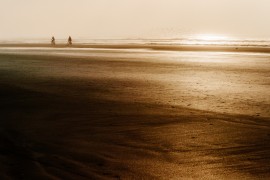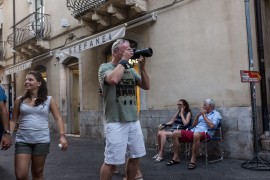There are dozens of ways to learn photography, ranging from reading your camera’s manual to spending thousands of dollars to take classes at your local college. Figuring out the best way is a balance of time, cost, and effectiveness. Now granted, everyone learns in different ways (some are audible learners, visual, etc.) so we will look at the best ones here. When assessing the different ways of learning photography I used the variables – time, cost, difficulty, and quality of information. Is this a scientific? No, I don’t own any beakers or Bunsen burners, but they are the best ways.
The Internet
The internet is used for more than just porn one of the best and worst sources of education (confused yet?). The internet is full of contradictions, you’ll read an article that tells you to only shoot in RAW format and then the very next article says shooting in JPEG format is the way to go (both ways are good and each has its place).
Using the previous mentioned variables, the internet is the best resource you have to learn photography (from the basics all the way up to advanced). There are free tutorials on every other photography blog/website, YouTube is full of video tutorials that will walk you through complex processes, and there are forums (places where the average Joe can freely discuss topics amongst each other) everywhere. You can learn at your own pace and not have to worry about meeting deadlines or showing up for a class. Getting started is as simple as pulling up Google search and using some of these searches:
Learn Photography
How to Use My Camera
Using the Manual Settings on My Camera
Become a Better Photographer
Photography 101
PhotolisticLife is full of tutorials on how to use your camera in each of the manual modes as well as guides to help you improve your skills once you learn the basics. They can all be found using the search bar to the right or clicking here for easy to understand camera guides.
Read, read, and then read some more. If you come across something you don’t understand, like a new term, open a new tab in the top of your browser and Google it. Soon you’ll find yourself staying up until 2 or 3 in the morning chasing information down the rabbit hole that is the internet.
Print Magazines and Books
Books are inexpensive and make you look smart. When was the last time you walked into someone’s house, saw a bookshelf full of leather-bound books, and thought “I’m smarter than this guy?” Never, that’s when. The best thing about books is that you can read, reread, and re-reread again if you need to refresh your memory in the future. Books are similar to the internet but typically they tend to have a little more credibility, not many publishers will publish a book without making sure the author knows their stuff.
A great way to find the books you are looking for, written in a way you can understand, is to go to the local book store and “Showroom.” When one “showrooms” they find the book they want at the store and then order it on the cheap from places like Amazon. I can normally find books on Amazon for about half of the price that the book stores want.
Apprenticeship
When I started my career (not photography) I began with an apprenticeship. I learned more in 12 months of being an apprentice than I did in four years of studying text books. Apprenticeships allow you to soak up the experience that someone else has and build on it, improving on practices that already work.
Make no mistake, being an apprentice can be a thankless, tough job. You’ll lug equipment from here to there, run errands, and follow your mentor around like a lost puppy. All that being said, you’ll also get to see first hand what it takes to be a photographer and hopefully learn what mistakes to avoid. You’ll make connections being an apprentice that you wouldn’t otherwise have the opportunity to make. Don’t be shy about riding the coat tails of your mentor.
The potential downfall of being an apprentice is pairing up with a mentor that see’s you as a work horse and has no desire to help you learn the ropes. Sadly, there are a lot of people who would love to take advantage of free help. Keep in mind that the apprentice/mentor relationship is a two-way street. If your mentor isn’t holding up their end of the arrangement then don’t feel bad about ditching them and finding one that will.
Classroom
Taking classes in photography can be beneficial if you get the right teacher, but you won’t know until you’ve shelled out the money. Going to school to be a photographer is a terrible idea. I don’t mean you should not be a photographer but if you don’t hate your money you may want to consider getting a degree in something semi marketable and working your way into photography on the side. If you make the right decisions you will be able to land a good job that affords you the ability to travel and spend time doing photography in your free time without having to starve from lack of money. You’d be amazed how many photographers I know who have sold their photography equipment after years of struggling to make a go of it only to have to give up their passion to take a job doing something menial because they don’t have a degree in something marketable. (I apologize to the folks with degrees in photography, hopefully you are lighting the world on fire with your sheer awesomeness and I welcome your feedback in the comments).
When taking classes just remember you are only getting one persons point of view and photography is an art of expression… Self expression. It doesn’t have to be done one way or no way at all. There is no mold for good photography, the photographs that really stand out tend to be the ones that break the mold. Class rooms are a great place to learn the fundamentals but be sure to question everything (I don’t mean to literally raise your hand every chance you get but do some research and see what others have to say about the subject). There is a pretty good chance that your favorite photographer never stepped foot in a class room so don’t believe it’s a requirement to be a good photographer.
If you do decide that taking a class is the way to go then I’d highly recommend taking an online class that you can complete at your pace. Look for one where you actually interact with the instructor as opposed to taking a class that was baked years ago and lacks feedback and interaction from the instructor.
Conclusion
So which is the best method? Magazines, books, and the internet are the three I would (do) spend my time with. I think the classroom should be your last resort due to costs and, unfortunately, ineffectiveness. Don’t get me wrong, I’m sure there are phenomenal classes out there but they are few and far between, if you find one and can afford it then I’d say give it a go.
Finding a good mentor is like finding a needle in a hay stack, not only do you have to find a person interested in helping you but you also have to find one that is interested in the same type of photography as you in your geographic region… I’d say easier said than done but that’s not even easy to say.
As you learn from the various sources be sure to keep an open mind and break the “rules” from time to time. There is no law that says you need to shoot the way someone before you shot in order to get a decent photograph. Forge ahead and create your own style while building off of what you learn from others.







Very good advice. I was fortunate enough to be able to sign up to a two year full time college course in “Artistic Photography” in the local college of art – free. Sounds good, was good, but a lot of time was spent in the lab developing film. I felt this was time wasted in so far as my interest was in making photos rather than developing them – and the majority of the time was spend in the lab. We had two hours a week on Photoshop! Times change.
Something people often forget is that you can be an excellent photographer and a terrible businessman. Going freelance as a terrible businessman is a recipe for disaster. It’s a demanding profession, but then so is any aspect of art. The more knowledge you have about your art the better you can manipulate or use that knowledge to achieve what you want.
Thanks, I couldn’t agree more.
I agree with David and John. You do not have to spend a fortune on photography classes. If photography is your passion, you can find almost everything you need on the Internet, on Amazon, and by taking up an apprenticeship. The more you practice, the more you discover about techniques and the art of taking pictures.